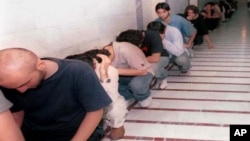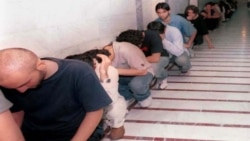Universities across Iran have opened their doors for the new school year. Dozens of Iranian students who have been victimized by the government’s systematic crackdown against those expressing peaceful political views, however, will not be attending classes. Over 30 of them are in prison, including Majid Tavakoli, serving a nine-year sentence because of a speech he gave critical of the Iranian regime; Behareh Hedayat, serving a nine-and- a-half-year sentence for so-called crimes like “insulting the President” and “propagation of falsehoods;” and Zia Nabavi, serving 10 years for “creating unease in the public mind.”
One of Iran’s largest student groups, Tahkim-e Vahdat, published a report in January 2012 documenting the arrests of students in Iran. In addition to the students currently behind bars on national security related charges, the report said that more than 400 students have been arrested by government authorities since March 2009, and more than 200 have been convicted of crimes.
The Iranian regime has a long history of discrimination in higher education. Hundreds of student activists have been barred from pursuing their education because their records have been specially marked or “starred.” Iran’s Minister of Science, Research and Technology Kamran Daneshjoo has declared that “individuals who participated in the 2009 insurrection. . . .have no right to enter universities.” For years, members of Iran’s Baha’i community have been prohibited from acquiring university education because of their religious beliefs. In August of this year, Iran’s female university students have been told that they cannot pursue advanced degrees in 77 different fields of study.
In another chilling move for Iranian students -- particularly those who are studying or considering studying abroad -- the Iranian regime in May sentenced Iranian graduate student Omid Kokabee to 10 years in prison for allegedly “communicating with a hostile government.” He had been studying physics at the University of Texas and went home to visit his family in 2011.
In a video address, Secretary of State Hillary Clinton said to Iranian students that “as the Iranian government continues to stifle your potential, we will stand with you. We will support your aspirations, and your rights. And we will continue to look for new ways to fuel more opportunities for real change in Iran.”
One of Iran’s largest student groups, Tahkim-e Vahdat, published a report in January 2012 documenting the arrests of students in Iran. In addition to the students currently behind bars on national security related charges, the report said that more than 400 students have been arrested by government authorities since March 2009, and more than 200 have been convicted of crimes.
The Iranian regime has a long history of discrimination in higher education. Hundreds of student activists have been barred from pursuing their education because their records have been specially marked or “starred.” Iran’s Minister of Science, Research and Technology Kamran Daneshjoo has declared that “individuals who participated in the 2009 insurrection. . . .have no right to enter universities.” For years, members of Iran’s Baha’i community have been prohibited from acquiring university education because of their religious beliefs. In August of this year, Iran’s female university students have been told that they cannot pursue advanced degrees in 77 different fields of study.
In another chilling move for Iranian students -- particularly those who are studying or considering studying abroad -- the Iranian regime in May sentenced Iranian graduate student Omid Kokabee to 10 years in prison for allegedly “communicating with a hostile government.” He had been studying physics at the University of Texas and went home to visit his family in 2011.
In a video address, Secretary of State Hillary Clinton said to Iranian students that “as the Iranian government continues to stifle your potential, we will stand with you. We will support your aspirations, and your rights. And we will continue to look for new ways to fuel more opportunities for real change in Iran.”






